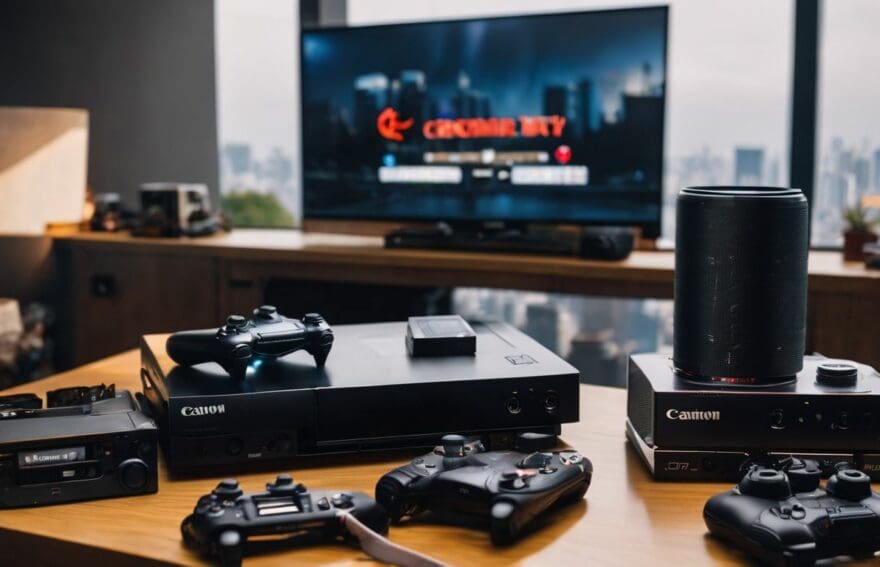From the Couch to the Championship: One Player’s Journey in the FGC

Updated On: November 29, 2025 by James Connolly
Embarking on an adventure within the vibrant Fighting Game Community (FGC) can sometimes feel like a bit of a solo venture, particularly when you’re without local chums to exchange blows with.
We completely sympathise; it’s a path we’re familiar with too and understand how daunting it can be going at it alone. Rather intriguingly, some of the globe’s elite players have navigated this very obstacle on their way to fame.
Our piece provides strategic insights and anecdotes from one enthusiast who graduated from informal sofa skirmishes to securing triumphs on the grand platforms of tournaments such as Evo Championship.
Immerse yourself in our narrative and learn the artful blend for ascending through FGC ranks!
Starting Your FGC Journey
Overcoming the lack of local players and joining online communities are crucial steps in beginning your FGC journey. Connecting with others who share your passion for competitive gaming will open up a world of opportunities for skill-building and networking within the community.
Overcoming the lack of local players
- Seek out online forums and communities related to Fighting Game Community (FGC) titles like Street Fighter, Tekken, or Super Smash Bros Ultimate. These places are buzzing with players of all levels who are eager to connect and compete.
- Set up virtual matches with competitors you meet online. This gives us a chance to face different playing styles and strategies, which is essential for growth in competitive gaming.
- Organise remote tournaments or join existing ones. Not only do they mimic the pressure of live events, but it’s also a fantastic way to gauge your skill level against others.
- Use social media platforms to find other passionate gamers. Twitter hashtags, Facebook groups, and Discord channels often have communities focused on Esports where you can find potential practice partners.
- Embrace training mode as a solo player. We spend hours honing our combo execution and learning characters’ frame data for an edge in the competitive scene.
- Record your gameplay when practising alone or during online matches. Review these recordings to analyse mistakes, learn from them, and adjust your fighting game strategy accordingly.
- Consider creating content such as tutorials or match commentaries; it invites interaction with high-level players who can offer tips for skill improvement.
- Stay active in discussions about tournament play. Engage with threads discussing events like the Shadowloo Showdown V to learn from others’ experiences.
Joining online communities
- Engaging with like – minded players on forums and social media allowed us to stay updated on the latest strategies, patches, and tournament news within the FGC community.
- Joining specific game – related groups helped us to connect with players who were equally dedicated to improving their skills in our chosen games.
- Participating in online tournaments hosted by these communities provided an opportunity to put our training into practice against diverse opponents from around the world.
- Networking with established players and coaches on these platforms granted us access to valuable mentorship, guidance, and resources that contributed to our growth and development in the FGC.
Learning with Classic or Modern Controls
Understanding the differences between classic and modern controls is essential to finding the best fit for your playstyle. It’s important to consider personal preference versus community standards when choosing which control scheme to use.
Understanding the differences
When comparing classic and modern controls in the FGC, it’s essential to consider the nuances of each. High rank players often make decisions based on personal preference or community standards when choosing between the two.
The choice ultimately depends on individual player skills and training regimens, with some finding success in adapting to newer control options while others may prefer sticking to traditional methods.
Competitive mindset and gaming success are directly impacted by the type of controls used, driving high level players to continuously refine their techniques based on these differences.
Appreciating the variations between classic and modern controls is crucial for player development within the FGC. It shapes a gamer’s journey and can profoundly impact their performance in championships.
Personal preference vs community standards
Understanding the differences between classic and modern controls is crucial for any fighting game player. While personal preference plays a significant role in choosing the right control scheme, it’s essential to consider community standards as well.
Adapting to widely accepted control setups can facilitate seamless participation in local events and online competitions, ensuring a level playing field amongst players. Balancing personal comfort with adherence to community standards ultimately contributes to an inclusive and collaborative gaming environment within the FGC.
Adhering to community standards while respecting individual preferences fosters diversity and inclusivity within the FGC, creating an environment where players feel supported while still being able to express their unique gameplay styles.
Self-Improvement Through Playing with Others
Playing with a diverse range of opponents is crucial for self-improvement in the FGC. Learning from losses and seeking out local events are also important steps towards growth as a player.
The importance of diversity in opponents
Facing a variety of opponents in the FGC is crucial for honing our skills. Engaging with players of different playstyles and strategies challenges us to adapt and evolve, ultimately making us more versatile competitors.
Learning to counter diverse tactics cultivates a deeper understanding of the game, allowing us to anticipate and react more effectively.
Diverse opponents also broaden our perspectives on the gaming community, fostering inclusivity and respect for different approaches. This exposure not only enhances our gameplay but also enriches our overall experience within the FGC.
Learning from losses
When we lose in the FGC, we see it as an opportunity to grow and improve. Here’s how we do it:
- Analysing mistakes made during the match, learning from what went wrong.
- Adjusting strategies by identifying weaknesses and working to strengthen them.
- Seeking feedback from more experienced players to gain valuable insights.
- Embracing losses as valuable learning experiences, allowing us to adapt and evolve our gameplay.
- Developing resilience and mental fortitude to bounce back stronger after each defeat.
- Reframing losses as stepping stones towards success, motivating ourselves to push harder for improvement.
- Using setbacks as motivation to practise and refine our skills, ultimately becoming better players overall.
Participating in local events
- Participating in local events provides an invaluable opportunity to measure our progress and test our skills against a diverse range of opponents. It allows us to apply the lessons learned from losses, refine our strategies, and embrace different playstyles. Additionally, these events foster a sense of camaraderie within the FGC community as we bond over our shared passion for gaming. The support and encouragement received from fellow players propel us to strive for excellence and continuously improve. Moreover, competing in these events offers firsthand experience of the competitive aspects of the FGC, enabling us to adapt and thrive in high-pressure situations.
The Changing of the Guard
Reflecting on personal growth from a beginner to a seasoned player and discussing where the FGC is heading in terms of new games, technology, and community involvement.
Reflecting on personal growth
After overcoming the lack of local players and honing our skills through online communities, we realised that personal growth in the FGC is about adapting to new challenges. Whether it’s learning from losses or embracing diverse opponents, these experiences have shaped our journey and made us more resilient competitors.
The changing landscape of the FGC has shown us the importance of continuing to evolve and improve, inspiring us to set goals, track progress, and make use of available resources and tools.
Where the FGC is headed
The FGC is evolving rapidly, with the rise of online tournaments and streaming platforms bringing competition to a wider audience. More diverse players and games are gaining recognition within the community, offering fresh experiences and perspectives.
The professional gaming circuits continue to grow, providing opportunities for dedicated individuals to showcase their skills on a global stage. As Esports gains mainstream attention, the FGC is expected to attract even more passionate gamers and expand its reach further into the future.
The FGC’s inclusive environment fosters camaraderie and support among players, fostering a sense of community spirit that transcends geographical boundaries. With an emphasis on individual skill and strategy, the competitive landscape of the FGC continues to be shaped by dedicated players striving for excellence in their chosen games.
Developing a Training Mindset
Setting specific goals and tracking progress is essential for growth in the FGC. Utilising resources and tools such as frame data, match analysis, and coaching can help to develop a strategic training mindset.
Setting goals and tracking progress
To improve in the FGC, we set clear and achievable goals for our gameplay. We track our progress by:
- Identifying specific areas of improvement, such as executing a certain combo or mastering defensive strategies.
- Using gameplay statistics and performance metrics to monitor our progress over time.
- Seeking feedback from peers and mentors to gain insights into our strengths and weaknesses.
- Reflecting on past performances to understand what worked well and what needs refinement.
- Adjusting our goals as we make progress to ensure continuous growth and development.
Utilising resources and tools
To excel in the FGC, we must utilise various resources and tools. Here are some strategies for making the most of available resources:
- Research and study top players’ techniques – observing their gameplay can provide valuable insights into advanced strategies and tactics.
- Access online tutorials and guides – these resources can offer in-depth explanations of game mechanics, character abilities, and advanced techniques.
- Utilise frame data apps and tools – understanding frame data is crucial for optimising combos, understanding match-ups, and improving overall gameplay.
- Joining Discord or other gaming communities – participating in discussions with experienced players can provide tips, advice, and opportunities to connect with potential practice partners.
- Watching tournament streams – studying high-level tournament play can help us identify trends, learn new techniques, and understand the current meta within the FGC.
Conclusion
5. Developing a Training Mindset.
– Setting goals and tracking progress
– Utilising resources and tools
Conclusion:
In conclusion, developing a training mindset is crucial for anyone looking to make their mark in the FGC. By setting clear goals and regularly tracking your progress, you can stay motivated and focused on improvement.
Furthermore, making use of available resources and tools will help you refine your skills and ultimately enhance your performance in the championship arena.
FAQs
1. What does “From the Couch to the Championship” mean in gaming?
“From the Couch to the Championship” refers to a player’s personal journey of starting as an amateur gamer playing at home and advancing all the way to compete in professional FGC, or Fighting Game Community, championships.
2. Can anyone become a championship-level player in FGC?
Yes, with dedication and practice, any gamer can improve their skills and potentially rise through the ranks to compete at FGC championships.
3. How long does it take for a regular player to reach championship level in gaming?
The time it takes can vary widely; some players might progress quickly with natural talent and intense training, while others may take longer to develop their skills sufficiently enough for championship competition.
4. Are there true stories of gamers going from casual play to winning championships?
Indeed! There are many inspiring stories within the Fighting Game Community of players who started out casually on their couch before working hard and eventually triumphing at major gaming championships.


